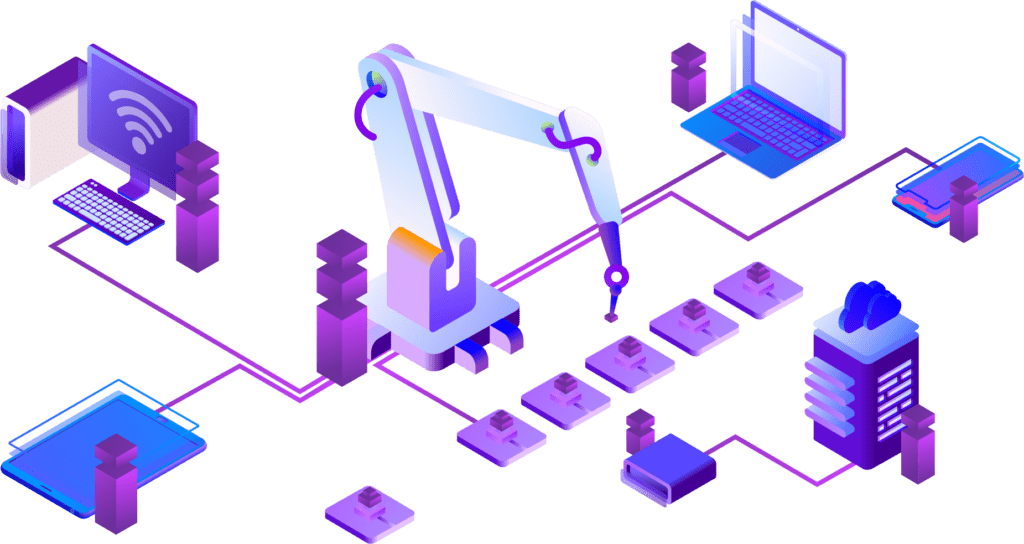The Next Business Revolution
- Author: M.Sc. Javier Suarez
- Posted On: Thursday March 2nd, 2023
- Post Comments: 0
How is intelligent automation transforming business operations?
Automation + Intelligence = The Future of Business: How AI is Transforming the Way Companies Operate.
In today’s business world, technological innovation is an imperative need to remain competitive in an increasingly saturated market. While it is true that the implementation of disruptive technologies can represent a challenge, it is also true that it can make the difference between business success and failure. Process automation based on artificial intelligence has become one of the main technological trends today and its potential to increase efficiency and productivity in companies is undeniable. In this blog, we will explore how automation can be the key to being at the forefront of your industry and staying two steps ahead of the competition.
Although process automation based on artificial intelligence is a powerful tool, many companies have not yet made the leap. This may be due to a variety of reasons, such as lack of budget, resistance to change, or lack of knowledge about the technology. The lack of AI-based process automation can result in a number of painful situations for companies, including missed growth opportunities, high costs, human errors, among many others.
How Intelligent Automation is Transforming Businesses

The adoption of AI-based process automation represents a unique opportunity to improve the efficiency and profitability of business operations worldwide, especially in Latin America. Those who adopt this technology can have a significant competitive advantage in their industry.
According to Gartner, one of the leading technology research and consulting firms, up to 60% of companies globally have not yet adopted AI-based process automation. This number is even higher in Latin America, where many companies still operate with manual processes and have not implemented advanced technological solutions.
The lack of automation adoption can have a significant impact on a company’s efficiency, productivity, and profitability. In fact, according to McKinsey, process automation can increase productivity by up to 40% and reduce costs by up to 60%.
Possible Obstacles to Implementing AI-based Process Automation.
Según McKinsey y Gartner, los principales factores que impiden que las empresas adopten la automatización de procesos son la falta de comprensión de los beneficios y el potencial de la automatización de procesos, la falta de habilidades y talento que no se encuentran fácilmente en el mercado laboral, la cultura organizacional resistente al cambio y la apertura a la integración con otros sistemas más avanzados. Para superar estos obstáculos, sugieren crear conciencia, invertir en capacitación y en el desarrollo de habilidades especializadas, liderar el cambio cultural en todos los niveles de la organización y trabajar en la integración de soluciones de automatización de procesos con sistemas empresariales existentes.
It is important to note that automation adoption is not just about technology. It also involves cultural and organizational change, where business leaders must be willing to invest in training their staff and in the digital transformation of their processes.
According to McKinsey and Gartner, the main factors preventing companies from adopting process automation are the lack of understanding of the benefits and potential of automation, the lack of skills and talent that are not easily found in the labor market, the resistant organizational culture to change, and openness to integration with more advanced systems. To overcome these obstacles, they suggest creating awareness, investing in training and the development of specialized skills, leading cultural change at all levels of the organization, and working on integrating process automation solutions with existing business systems.
Case Study: Nubank and How Process Automation Boosted Its Growth

A success story in the fintech sector that has been recognized by McKinsey is the Brazilian company Nubank.
Before the implementation of its process automation solution, Nubank had a manual and slow process for credit card approval, which generated long waiting lines and a high rejection rate of credit card applications. Additionally, the manual process was also prone to human errors and increased the company’s operating costs.
To solve these problems, Nubank implemented an AI-based process automation solution that allowed for instant credit card approval. This solution used machine learning algorithms to analyze applicant data and make automated and real-time approval decisions.
As a result of implementing this solution, Nubank was able to significantly reduce the credit card application rejection rate, increase operational efficiency, and improve customer satisfaction. Additionally, the solution also allowed the company to rapidly expand into new markets and offer new financial products.
In terms of figures, it is estimated that the implementation of this process automation solution helped Nubank reduce operating costs by 25%, resulting in a savings of more than USD 30 million per year. Additionally, the company has achieved impressive growth in recent years, going from having 3 million customers in 2017 to over 70 million in 2022.
Adopting Process Automation.

For those companies that have not yet adopted digitalization in their operations, we encourage them to view the adoption of AI-based process automation not as a threat, but as an opportunity to improve their efficiency, increase productivity, and enhance the profitability of their operations.
It is not necessary to start with everything, begin with small pilot projects that allow you to experiment with the technology and see concrete results. Not all processes need to be automated, but rather those that generate the greatest benefits in terms of efficiency and productivity. This will allow you to validate your investment and justify its expansion in the future.
Process automation is not a static process but must be continually evaluated and improved. It is essential to have a team responsible for monitoring and optimizing the automated processes to ensure their effectiveness and efficiency over time. Partnering with reliable and experienced technology companies and providers who provide the necessary expertise and knowledge to carry out successful projects is another option for moving forward.
Remember that AI-based process automation is not just the future, but also the present. Companies that adopt this technology now will have a significant competitive advantage and be better positioned to face future challenges.
At TBBC, we are committed to helping companies take this important step and make the most of the opportunities offered by technology.
Contact us to learn more!


Leave A Comment